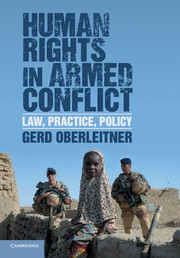Book contents
- Frontmatter
- Contents
- Acknowledgments
- Table of cases
- Table of Legal Instruments
- List of Abbreviations
- Introduction
- Part I Human rights in armed conflict: history of an idea
- Part II Human rights and humanitarian law: theory
- Part III Human rights and humanitarian law: challenges and commonalities
- Part IV The dynamics of war and law
- Part V Enforcement: practice and potential
- 17 United Nations Human Rights Council: monitoring armed conflicts
- 18 United Nations High Commissioner for Human Rights
- 19 United Nations human rights treaty bodies
- 20 The Inter-American human rights system
- 21 The European Court of Human Rights
- 22 The African Commission on Human and Peoples’ Rights
- 23 Monitoring and litigating humanitarian rights: prospects
- Conclusion
- Bibliography
- Index
- References
18 - United Nations High Commissioner for Human Rights
Published online by Cambridge University Press: 05 March 2015
- Frontmatter
- Contents
- Acknowledgments
- Table of cases
- Table of Legal Instruments
- List of Abbreviations
- Introduction
- Part I Human rights in armed conflict: history of an idea
- Part II Human rights and humanitarian law: theory
- Part III Human rights and humanitarian law: challenges and commonalities
- Part IV The dynamics of war and law
- Part V Enforcement: practice and potential
- 17 United Nations Human Rights Council: monitoring armed conflicts
- 18 United Nations High Commissioner for Human Rights
- 19 United Nations human rights treaty bodies
- 20 The Inter-American human rights system
- 21 The European Court of Human Rights
- 22 The African Commission on Human and Peoples’ Rights
- 23 Monitoring and litigating humanitarian rights: prospects
- Conclusion
- Bibliography
- Index
- References
Summary
Similar to the Human Rights Council, the mandate of the High Commissioner for Human Rights does not refer to armed conflict or international humanitarian law. It comprises the promotion and protection of all human rights, including the right to development, the provision of advisory services and technical assistance, the coordination and mainstreaming of human rights in the UN, being in dialogue with governments on human rights matters as well as carrying out any other task assigned by the competent UN bodies. Similar to the Council, the High Commissioner is set up by the UN General Assembly and entrusted not with exercising legal scrutiny under international treaty law but to respond to political challenges which involve the application of international human rights law. The High Commissioner is neither mandated to monitor observance of international humanitarian law nor to speak out on violations of humanitarian law. But like the Human Rights Council, it may be faced with situations where an evaluation of the human rights situation may make it necessary to take into account other sources of international law, including international humanitarian law.
In situations of armed conflict the High Commissioner has regularly monitored human rights and humanitarian law and has used its mandate to engage in activities which are best described as humanitarian advocacy and humanitarian diplomacy, mediation and the provision of good offices. In 2004, for example, Acting High Commissioner Bertrand Ramcharan dispatched an emergency mission to Chad and Darfur ex officio. And in 2010, the Office of the High Commissioner was entrusted with carrying out fact-finding activities in Côte d’Ivoire following the 2010 presidential elections. The report on the mission detailed violations of human rights and international humanitarian law “which include summary executions, enforced disappearances, rape, torture, cruel, inhumane and degrading treatment, arbitrary arrests and detentions, pillaging and looting.” It did not, however, indicate any legal norms of humanitarian law which were violated by these acts and refrained entirely from mentioning the Geneva Conventions and Additional Protocols.
- Type
- Chapter
- Information
- Human Rights in Armed ConflictLaw, Practice, Policy, pp. 259 - 261Publisher: Cambridge University PressPrint publication year: 2015

